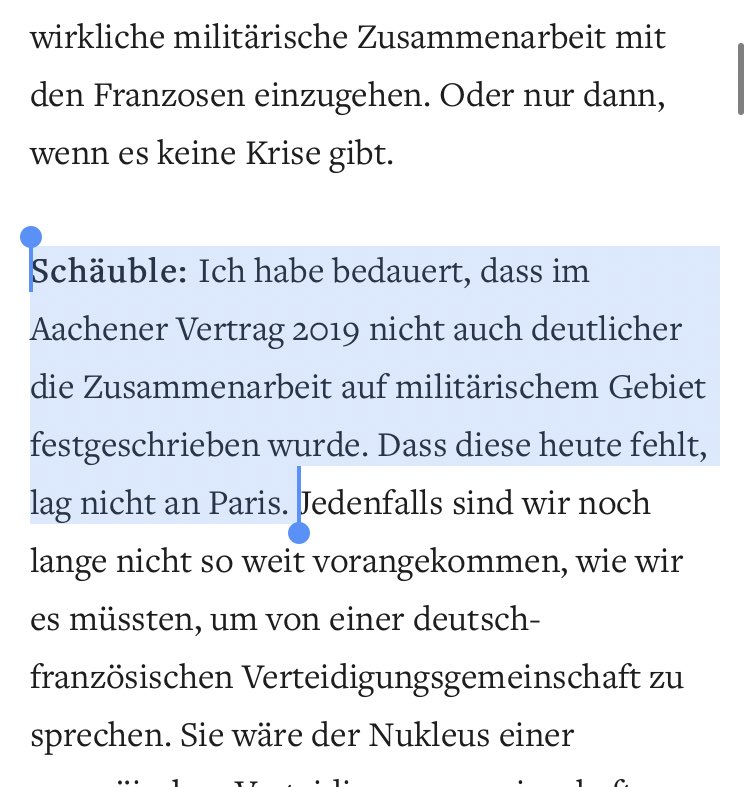
Yesterday, the candidate for chancellor for the German Greens, Annalena Baerbock gave a long recorded interview *on foreign and security policy*.
You can watch it here: baks.bund.de/de/aktuelles/d…
Thread with some things I find noteworthy.
You can watch it here: baks.bund.de/de/aktuelles/d…
Thread with some things I find noteworthy.
This interview is in and of itself really good news. We *need* to talk more about security and defence policy, and foreign policy in Germany.
(You think you've heard me say this before? Well yes I have warontherocks.com/2019/02/it-is-… )
(You think you've heard me say this before? Well yes I have warontherocks.com/2019/02/it-is-… )
Some thoughts on what Baerbock said & how she did (my take, obviously).
Overall, she appeared rather well informed on the relevant topics - though not very concrete in her proposals.
Overall, she appeared rather well informed on the relevant topics - though not very concrete in her proposals.
It's election season, foreign policy is hard etc - so being concrete is difficult. But what worried me slightly is that several times she laid out the grand lines of her thinking, the interviewer then said "ok, could the following be a good proposal: ..." and she just... agreed.
Maybe his proposals was what she was thinking all along, fine. But it struck me, that a skilled diplomat or politician (think Putin) could use that same approach to his advantage. "You're high-level approach is all great, and here is how we do it."
Another point that is maybe relevant for non-Germans who think of Greens as very left activists: Baerbock made very clear that the existence and security of Israel is Germany's highest priority.
I also liked that she discussed the threat of blackouts (through #cyber attacks though it could also come for different reasons). I absolutely want the next government to take this on.
I recommend *the French* to listen very closely at min 36:17 (FCAS) and min 1:06:50 (EU cooperation).
What did she say?
baks.bund.de/de/aktuelles/d…
What did she say?
baks.bund.de/de/aktuelles/d…
On FCAS (slightly edited and translated):
"In the German debate, security policy issues, such as the equipment of the Bundeswehr, are strongly mixed up with labor and economic policy issues and with European policy issues. ...
"In the German debate, security policy issues, such as the equipment of the Bundeswehr, are strongly mixed up with labor and economic policy issues and with European policy issues. ...
"...For example, when we talk about #FCAS. FCAS can make a lot of sense in terms of European policy. But the question of whether we currently rather need the money for protective gear for soldiers is a strategic debate that has to be had."
"... Politics is not an end in itself, you always have to ask yourself: "What is our goal and what means do I have to get there?"."
Which means that #FCAS isn't exactly safe. My colleague @_RafaelLoss made a similar point here
ecfr.eu/article/how-ge…
ecfr.eu/article/how-ge…
Now, I don't think Baerbock is wrong when she says that we haven't really discussed and answered important questions re FCAS in Germany- most notably "what exactly do we need this system for?" But shaking FCAS is super risky for the Franco-German relationship.
The other moment that I found relevant for the Franco-German relationship is from ca. 01:06:30 where #Baerbock speaks of her idea of the EU. She said (slightly edited and translated):
"I am a passionate European - and I struggle with the idea of “core Europe”. For me, increased cooperation on certain issues is not [cannot happen only in] "core Europe". Because, historically, it is an important achievement that East and West have come together in Europe.
...We cannot risk that. And that is why increased cooperation, which happens in individual groups, must always be open to all Europeans."
So, overall: interesting interview. Some Franco-German issues on the horizon, it the Greens enter government. But my main concern over a Green-led government (not one that includes them which I think can be pretty good, see👇) is this:
ecfr.eu/article/why-a-…
ecfr.eu/article/why-a-…
The Greens are actually pretty hawkish, from a foreign policy point of view. They are much more openly critical of China, of Russia, than most other German parties. It's, as they say, a values-based foreign policy. The thing is...
The thing is: they are hawkish on foreign policy, but pretty guarded when it comes to funding the Bundeswehr and military capabilities. And that, in my view, is a pretty dangerous approach.
And no, this isn't about preparing for an actual war against China or Russia. But if you take strong stances on foreign policy, you need to be strong geopolitically - and that strength includes military capabilities.
That was my two cents. And now I want Laschet to do a similar interview please!
• • •
Missing some Tweet in this thread? You can try to
force a refresh








